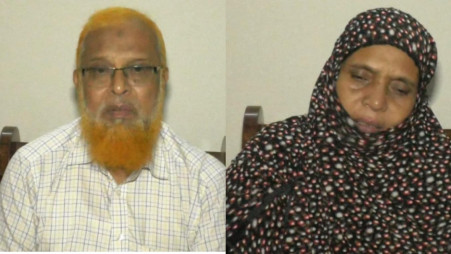6 years on: Why and how Abrar Fahad was killed
On 16 March 2025, the HC upheld the trial court's verdict confirming the death penalty of 20 Buet students and life imprisonment of five others in the Abrar Fahad murder case

Today (7 October) marks the sixth death anniversary of Bangladesh University of Engineering and Technology (Buet) student Abrar Fahad, whose brutal murder in 2019 exposed the violent culture of political dominance within public university halls.
On 6 October 2019, Abrar's mother fed him and saw him off on a bus from Kushtia to Dhaka. That was the last time she saw her son.
That evening, he was called to a room at Buet's Sher-e-Bangla Hall by members of now-banned Bangladesh Chhatra League (BCL) - the student wing of the then-ruling Awami League - where he was beaten for hours.
The 21-year-old electrical and electronic engineering student died that night from his injuries.
According to BBC reports at the time, witnesses said Abrar was taken from his dorm room around 8pm and beaten for at least four hours. The doctor who conducted his autopsy confirmed that his body was "heavily bruised" and bore clear signs of blunt force trauma.
"We think he died of attack with blunt objects," said Dr Sohel Mahmud, head of the forensic department at Dhaka Medical College Hospital.
CCTV footage later showed several men carrying Abrar's lifeless body through the dormitory corridors.
Police arrested at least 13 students, all from Buet, including multiple BCL activists. The organisation subsequently expelled 11 members of its Buet unit at that time.
On 16 March 2025, the HC upheld the trial court's verdict confirming the death penalty of 20 Buet students and life imprisonment of five others in the Abrar Fahad murder case.
Of the total 25 accused in the case, five are still on the run.
What led to Abrar's killing
Just a day before his murder, on 5 October 2019, Abrar posted a Facebook status criticising Bangladesh's water and energy agreements with India. He questioned why Bangladesh was giving away natural resources while receiving little in return.
"After the partition in 1947, the western part of the country had no seaport. The then government requested India to use the Kolkata port for six months, but they refused. Eventually, to combat famine, the Mongla port was opened even before its inauguration. Ironically, today India is asking to use that very port," he wrote on his Facebook wall on 5 October 2019.
Referring to the Teesta water deal, he added, "When India's own states fight over sharing the Kaveri River water, we are offering 150,000 cubic metres of water daily without any exchange."
He also criticised gas export, saying, "A few years ago, India stopped exporting coal and stones to protect its own resources, yet we are ready to supply them gas while our own factories are shutting down due to shortages."
He concluded the post with a line from a patriotic Bangla poem, which can be translated as: "For others' sake, give up your own gain; offer your life and soul, for there is no greater joy than forgetting oneself for others."
Earlier, on 30 September 2019, he had posted another satirical status on the same topic, criticising India's opening of the Farakka Barrage after receiving hilsa fish from Bangladesh.
According to media reports, some BCL activists accused Abrar of having links with Islami Chhatra Shibir after his posts went viral. That night, they summoned him to a dorm room "for questioning".
Abrar was brought to Room 2011, known among the students to be a torture cell, along with his two mobile phones and laptop.
He never returned alive.
"Please take me to the hospital"
A Buet student who witnessed the incident told the BBC that he saw Abrar alive around 2am.
"I saw Abrar in room 2005, he was still alive... With help from some junior students, I carried Abrar downstairs. He was still alive, and he was saying, 'Please take me to the hospital quickly,'" the student said.
At 8:13pm on 6 October 2019, CCTV footage showed several now-banned Bangladesh Chhatra League (BCL) activists escorting Abrar Fahad, a second-year electrical and electronic engineering student at
Bangladesh University of Engineering and Technology (Buet), from his room.
By 10:07pm, another camera captured Abrar being carried out of the room 2011 after being beaten. He was still alive.
Another student said several others had gathered with the assistant provost to seek help, but BCL members began banging on the door to prevent interference.
At 2:34am on 7 October, the BCL leaders were seen carrying Abrar's motionless body down the stairs.
By 3am, police recovered Abrar's body from the ground floor of Buet's Sher-e-Bangla Hall.
The aftermath
Abrar's murder sparked nationwide outrage and led to the suspension of all BCL activities at Buet. The killing reignited calls for political neutrality within educational institutions and prompted protests demanding justice and campus reforms.
Six years later, his parents, Rokeya Khatun and Barkat Ullah, say justice remains incomplete as several convicts are still absconding.
At the family's residence on PTI Road in Kushtia town, Abrar's belongings - his mobile phone, laptop, and study desk - remain just as he left them. His mementos are neatly kept in a showcase. But what the house no longer has is Abrar himself; only his memory, an unending sense of loss, and grief remain.
'Abrar murder accused used Chhatra League as shelter'
Still waiting for justice, Abrar's father Barkat Ullah said, "My son was martyred for his dream of a just and discrimination-free nation. We are still waiting for that dream to be fulfilled. We demand the immediate arrest of the fugitives and execution of the verdict."
Abrar's final Facebook post, criticising government policy, remains a chilling reminder of a young man's voice silenced for speaking his mind.



 Keep updated, follow The Business Standard's Google news channel
Keep updated, follow The Business Standard's Google news channel




















